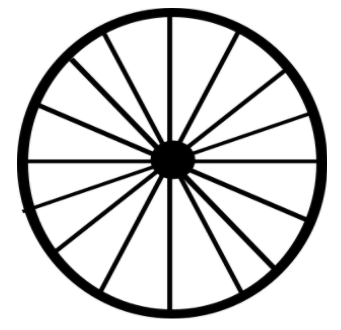Question
Question: A bicycle wheel has mass of the rim \(1kg\) and \(50\) spokes each of mass \(5g\) if the radius of t...
A bicycle wheel has mass of the rim 1kg and 50 spokes each of mass 5g if the radius of the wheel is 40cm then find the moment of inertia of the wheel.
a. 0.160kgm2
b. 0.174kgm2
c. 0.18kgm2
d. 0.196kgm2
Solution
We want to find the moment of inertia of the wheel along its centre. Here we clearly see that we have to find a moment of inertia of two things: one is the circumference of the wheel which is like a ring. And another thing is spokes which act like a rod and find its moment of inertia along one end of spokes.
Complete step by step answer:
We can solve this question in two parts first we calculate the moment of inertia of outer ring of wheel and second part is spokes of wheel which rotating along there one end as seen in figure

As we can clearly see in figure the outer part of wheel (rim) act as a ring so the moment of inertia of ring along its centre is given as
⇒Iring=MR2
Where M− mass of the ring
R− Radius of ring
Mass of wheel rim is given M=1kg
Radius of wheel is R=40cm=40×10−2m
⇒Irim=1×(40×10−2)2
Solving it
Irim=0.16kgm2 ........ (1)
Now we calculate the moment of inertia of spoke along one end of spoke we know the moment of inertia of rod along its end is Irod=31ml2
Mass of spoke is given m=5g=5×10−3kg
Length of spoke is l=40cm=40×10−2m
So the moment of inertia of spoke along its end is
⇒Ispoke=31×5×10−3×(40×10−2)2
Solving this,
⇒Ispoke=38000×10−7 ⇒Ispoke=0.00026kgm2
This is moment of inertia of one spoke but there are 50 spokes so moment of inertia of 50 spokes is
⇒Ispokes=50×0.00026
⇒Ispokes=0.013kgm2
So the total moment of inertia along centre of wheel is I=Irim+Ispoke
⇒I=0.16+0.013
⇒I=0.173Kgm2
∴I=0.174kgm2
Hence, the correct answer is option (B).
Note: Here we use the moment of inertia of spoke along its end is I=31ml2 some time we learned formula of inertia of rod along its centre of mass is Icom=12ml2
To find its moment of inertia along one end we apply parallel axis theorem which is I=Icom+ma2
Here a=2l distance between com of rod and one end of rod
I=12ml2+4ml2
Solve it
I=3ml2
So we use this formula in the above question.
